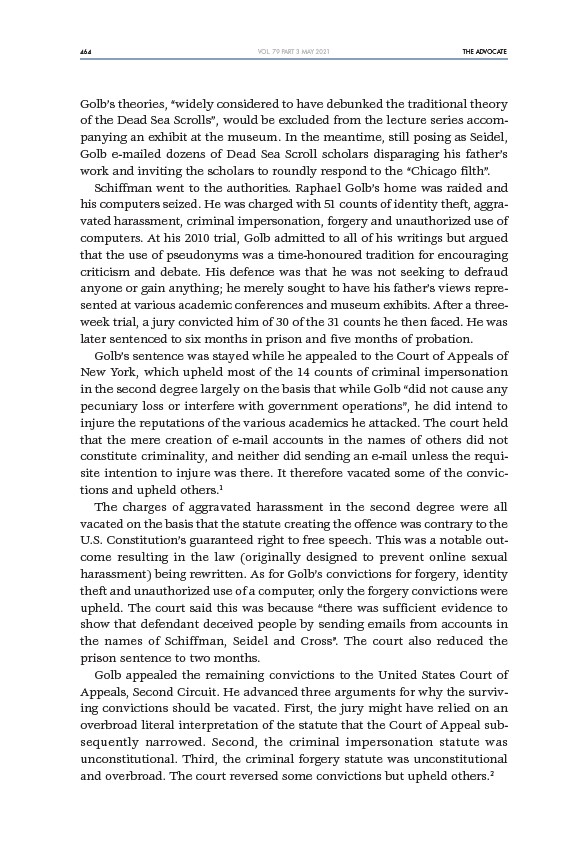
464 THE ADVOCATE
VOL. 79 PART 3 MAY 2021
Golb’s theories, “widely considered to have debunked the traditional theory
of the Dead Sea Scrolls”, would be excluded from the lecture series accompanying
an exhibit at the museum. In the meantime, still posing as Seidel,
Golb e-mailed dozens of Dead Sea Scroll scholars disparaging his father’s
work and inviting the scholars to roundly respond to the “Chicago filth”.
Schiffman went to the authorities. Raphael Golb’s home was raided and
his computers seized. He was charged with 51 counts of identity theft, aggravated
harassment, criminal impersonation, forgery and unauthorized use of
computers. At his 2010 trial, Golb admitted to all of his writings but argued
that the use of pseudonyms was a time-honoured tradition for encouraging
criticism and debate. His defence was that he was not seeking to defraud
anyone or gain anything; he merely sought to have his father’s views represented
at various academic conferences and museum exhibits. After a threeweek
trial, a jury convicted him of 30 of the 31 counts he then faced. He was
later sentenced to six months in prison and five months of probation.
Golb’s sentence was stayed while he appealed to the Court of Appeals of
New York, which upheld most of the 14 counts of criminal impersonation
in the second degree largely on the basis that while Golb “did not cause any
pecuniary loss or interfere with government operations”, he did intend to
injure the reputations of the various academics he attacked. The court held
that the mere creation of e-mail accounts in the names of others did not
constitute criminality, and neither did sending an e-mail unless the requisite
intention to injure was there. It therefore vacated some of the convictions
and upheld others.1
The charges of aggravated harassment in the second degree were all
vacated on the basis that the statute creating the offence was contrary to the
U.S. Constitution’s guaranteed right to free speech. This was a notable outcome
resulting in the law (originally designed to prevent online sexual
harassment) being rewritten. As for Golb’s convictions for forgery, identity
theft and unauthorized use of a computer, only the forgery convictions were
upheld. The court said this was because “there was sufficient evidence to
show that defendant deceived people by sending emails from accounts in
the names of Schiffman, Seidel and Cross”. The court also reduced the
prison sentence to two months.
Golb appealed the remaining convictions to the United States Court of
Appeals, Second Circuit. He advanced three arguments for why the surviving
convictions should be vacated. First, the jury might have relied on an
overbroad literal interpretation of the statute that the Court of Appeal subsequently
narrowed. Second, the criminal impersonation statute was
unconstitutional. Third, the criminal forgery statute was unconstitutional
and overbroad. The court reversed some convictions but upheld others.2